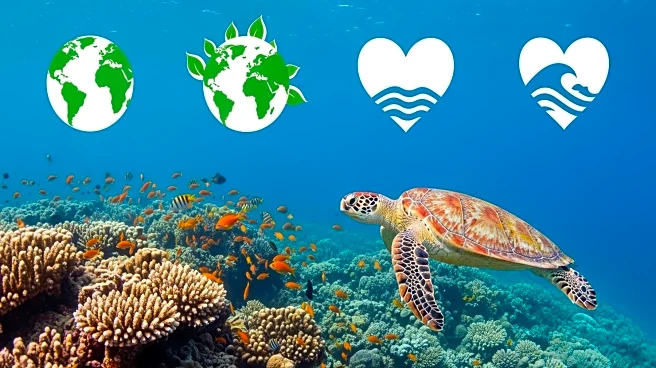What's Happening?
The MSC Foundation has actively participated in the IUCN World Conservation Congress, sharing insights from its Marine Conservation Center in The Bahamas. The Congress, held every four years, is a major
global event that brings together leaders from government, science, and philanthropy to discuss conservation priorities and sustainable development. Daniela Picco, Executive Director of the MSC Foundation, emphasized the role of corporate philanthropy in enhancing conservation efforts. The Foundation has transformed Ocean Cay, a former industrial site, into a hub for coral restoration and marine science education. Since 2023, it has partnered with the International Union for Conservation of Nature (IUCN) to assess coral species for the IUCN Red List of Threatened Species and conduct coral research for the IUCN Red List of Ecosystems. These efforts aim to alert the world to species and ecosystems at risk, guiding actions to prevent their decline.
Why It's Important?
The MSC Foundation's initiatives highlight the critical role of philanthropy in environmental conservation. By fostering public-private collaborations, the Foundation is advancing marine restoration and scientific research, which are essential for preserving biodiversity. The partnership with IUCN underscores the importance of global assessments in guiding conservation strategies. The Foundation's work on Ocean Cay demonstrates that restoration and tourism can coexist, provided they are guided by science and respect for local ecosystems. This approach not only supports biodiversity but also promotes sustainable development, ensuring that conservation efforts are inclusive and equitable. The insights shared at the IUCN Congress could inspire similar initiatives worldwide, potentially leading to stronger collaborations and new alliances in the conservation community.
What's Next?
The MSC Foundation plans to continue scaling up its efforts in coral reef restoration and marine science education. The successful identification of thermally resilient coral species and the establishment of open-water coral nurseries are promising developments. The Foundation aims to expand its Super Coral Reefs Program, which offers internships in marine science and focuses on propagating critically endangered coral species. These initiatives are expected to contribute significantly to the recovery of marine ecosystems. The IUCN Philanthropy Summit has laid the groundwork for future collaborations among philanthropists, potentially leading to new conservation projects and alliances. The MSC Foundation's ongoing commitment to conservation and education will likely influence global efforts to create a nature-positive, climate-resilient world.
Beyond the Headlines
The MSC Foundation's work raises important ethical considerations about the role of corporate entities in environmental conservation. By leveraging its resources and expertise, the Foundation is setting a precedent for how businesses can contribute to global sustainability efforts. The transformation of Ocean Cay from an industrial site to a conservation hub illustrates the potential for corporate-led initiatives to drive positive environmental change. This model of philanthropy could encourage other businesses to invest in similar projects, fostering a culture of corporate responsibility and environmental stewardship. The emphasis on equity and inclusivity in the Foundation's approach also highlights the need for conservation efforts to address social and economic disparities, ensuring that all communities benefit from sustainable development.









